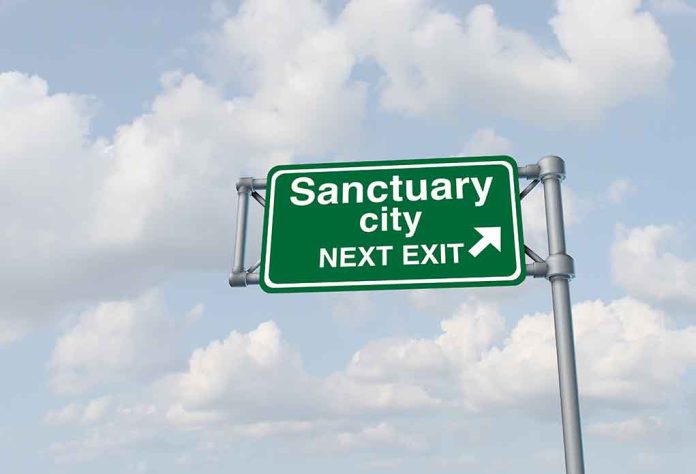🔴 Website 👉 https://u-s-news.com/
Telegram 👉 https://t.me/usnewscom_channel
Huntington Beach’s lawsuit against California’s sanctuary state law sets the stage for a legal showdown over immigration enforcement and local authority.
At a Glance
- Huntington Beach challenges California’s sanctuary state law, questioning its constitutionality.
- Lawsuit cites interference with local policing and violation of constitutional clauses.
- Highlights broader national debate on immigration policy and enforcement roles.
- Previous legal attempts to overturn sanctuary laws have failed.
Huntington Beach Versus California’s Sanctuary State Law
The City of Huntington Beach takes an assertive stance by filing a lawsuit against California over its sanctuary state policy. This law, known as SB 54, limits local and state law enforcement’s cooperation with federal immigration agencies. The lawsuit, primarily driven by city leaders like City Attorney Michael Gates, claims the law “runs complete interference for good law enforcement practices” and breaches the constitutional Supremacy and Naturalization clauses.
The arguments stem from Huntington Beach’s desire for local control over crime combating measures, without what they see as obtrusive state interference. Mayor Pat Burns further accentuates the need for federal assistance to tackle increasing crime rates related to human trafficking and gangs. Leaders argue that sanctuary policies undermine public safety by preventing adequate action against criminal illegal aliens.
National Immigration Debate and Previous Legal Predicaments
The lawsuit isn’t isolated; it mirrors a broader ideological struggle over immigration policies, heavily pronounced during Donald Trump’s presidency. While Huntington Beach’s legal challenge is noteworthy, it’s not the first. A 2019 ruling upheld California’s sanctuary laws, validating the state’s power to establish such regulations. Legal experts, however, remain skeptical about the lawsuit’s prospects, suggesting motivations are politically rather than legally anchored.
“Huntington Beach leaders filed suit in federal court Tuesday, claiming the city should be able to fight crime locally without state interference.” – City Attorney Michael Gates Source
The city faces criticism for not clearly showing definitive harm caused by the sanctuary law. Critics argue that SB 54 jeopardizes public security by harboring criminal immigrants, while proponents maintain it guards immigrant communities against racial profiling and legal harassment. These competing narratives fuel the legal and cultural friction over the state’s significant immigrant population and its right to sanctuary.
This is the way. Time to stop unconstitutional state level laws. https://t.co/5WDM9M9H4y
— TheJoRoxx 🇺🇸 (@TheJoRoxx) January 9, 2025
Implications of the Sanctuary State Law
SB 54’s implications stretch beyond Huntington Beach. Enacted as a measure against Trump’s immigration strategies, it dictates police non-cooperation with federal requests about detainees. Beyond local law enforcement, it mandates reduced immigration enforcement in schools, hospitals, and courthouses, aiming to protect immigrant privacy and safety.
“While there are many areas over which the states and the federal government share responsibility, immigration is not one of them.” – Hans von Spakovsky Source
Federal warnings of withholding funds from sanctuary regions compound the issue’s complexity, marking Huntington Beach’s lawsuit a pivotal challenge to state governance versus federal prerogative in immigration control. As this drama unfolds, it’s a stark reminder of the battles over authority, security, and community identity defining America’s approach to immigration.
